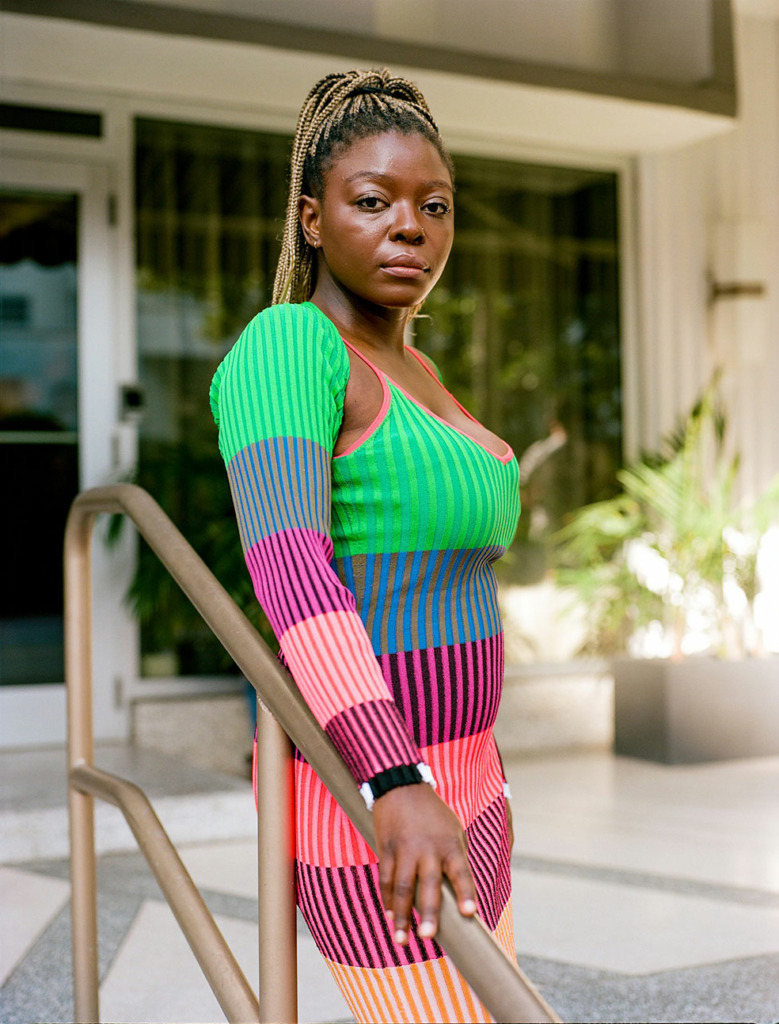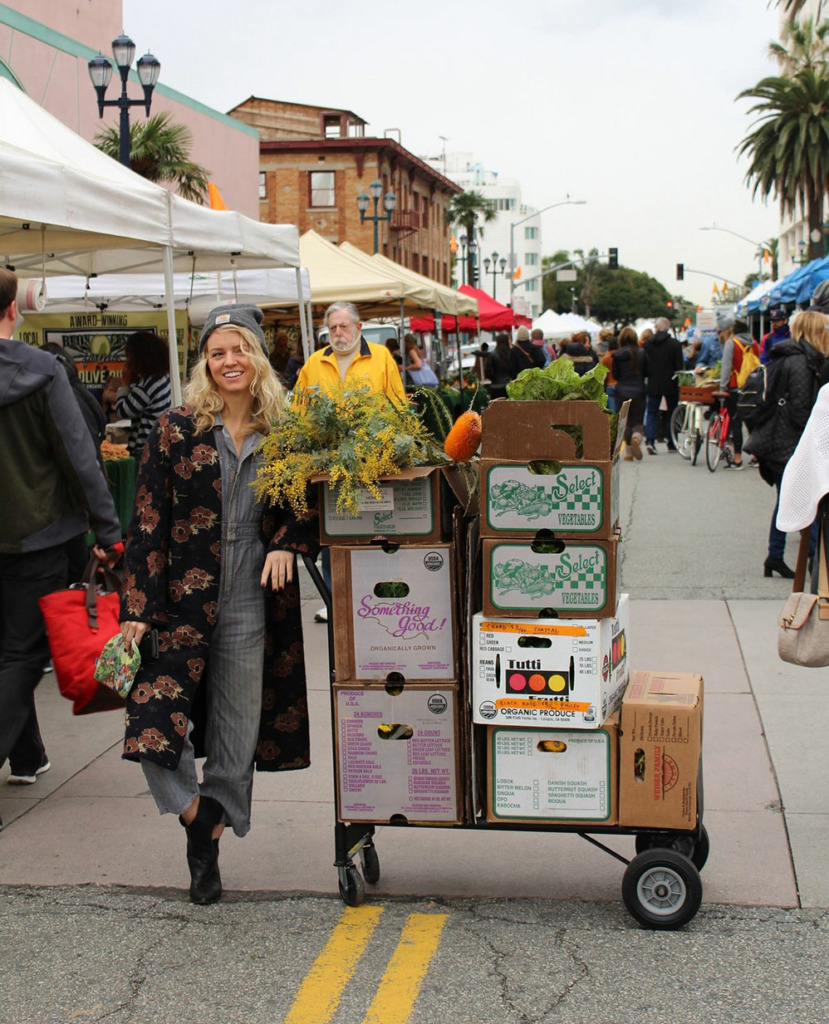Over the last decades, the world has seen a growing awareness and consciousness around the importance of living a sustainable life. Coming out of the pandemic, more and more people are recognizing the interconnectedness of our personal well-being with the health of our society and planet. This realization has led to an increasing interest in exploring self-care and well-being practices—including exercise, mindfulness, and therapy—as new ways of connecting with ourselves and the world.
Unfortunately, rising levels of interest have also driven corporations to double down on selling care and self-care as individual commodities removed from the current global socio-political landscape, where race, gender and economy play a decisive role in who has access to what. As a result, wellness culture has become a luxury—often built on the wisdom of people of color while excluding or neglecting them.
In a moment where maintaining our mental and physical health is more and more a priority, how do we fight what is advertised as self-care and define it on our own terms? How do we take care of ourselves while respecting and nurturing the well-being of others in society? We spoke with three women who are challenging the commodification of wellness—be it through the lens of inclusion, nutrition or community, they encourage us to look at the industry critically and create a more nuanced, inclusive understanding of care.
Sinikiwe Stephanie Dhliwayo
Sinikiwe Stephanie Dhliwayo always says her full name “it grounds me in Zimbabwe, where I was born. I have American sensibilities (I came here when I was seven), however, my soul belongs to the [African] continent.” By embracing and understanding her position as a Black immigrant woman, Sinikiwe has developed an approach to wellness outside of a system defined by financial resources and characterized by empty representations of well-being to the external world.

“There is a difference between the wellness industry and folks endeavoring to be well. By nature of being a human existing in the world, you intrinsically deserve to be well. However, because of things like capitalism, that isn’t always accessible to folks.”
Having worked in different spheres of the wellness industry—from a job at a men’s magazine to yoga studies with predominantly White customers—Sinikiwe quickly realized the flaws within the system. “Part of the conundrum of working in the wellness industry is that it is an industry that is very unwell. From the proliferation of gurus to using spirituality as an escape mechanism and eschewing things like politics for “‘love light,’ wellness in this context has never been the goal.”
With this critical point of view, she decided to create Naaya—a well-being company that lies at the intersection of social justice and wellness. Naaya looks to generate change through awareness and education on the systems that leave Black, Indigenous, and Non-Black people of color out of the conversation of being well. Through intersectional well-being lessons, reading material on anti-racism and consulting services for wellness companies, she is set to create space for Black folks to be “physically, spiritually, and mentally well.”
-
What would you change about how wellness is conceived today?
So much of how I endeavour to be well doesn’t look good if it doesn’t fit into a cute reel for the gram. I don’t shy away from it; I embrace it and would rather feel it all than find a means of escape. But the more I dig deeper into being in the wellness industry at large. I realize that many folks are looking for a quick fix meditating to be more productive, working out to fit a certain ideal, or even doing the thing just to say they do the thing; a status symbol, if you will. I also think how the wellness industry refuses to look at parallels to white supremacy and how it is detrimental to my well-being as a Black woman is immensely problematic. I do not have the luxury of living in a dream world where police brutality, systemic racism, etc., don’t exist. Because I can’t ignore how these things affect my lived reality, it has become more and more immediate that my work and Naaya serve to disrupt the status quo. I often joke about burning it all down to start over again, but alas, I need folks who are down for the cause to help me carry the torches and set the flames.
There is a difference between the wellness industry and folks endeavoring to be well. By nature of being a human existing in the world, you intrinsically deserve to be well. However, because of things like capitalism, that isn’t always accessible to folks.
For the wellness industry to improve, we need to continue having hard conversations and hold people/ brands accountable. In the summer of 2020, which I have dubbed Black Square summer, brands quickly communicated that they were in solidarity with Black Lives Matter. They raced to create infographics to include brands like mine. Some even went as far as to proclaim that they would give money or work in partnership with Black-owned brands to become more inclusive and diverse. In reality, this lasted five minutes—folks that flooded my inbox during that time have long since disappeared with their big proclamations. Unfortunately, there has yet to be a long-term sustainable change. I am doing my best with Naaya to create a company that will have a lasting positive impact on the physical, mental, and spiritual well-being of Black, Indigenous, and People of Color. If more brands were dedicated to long-term actionable change vs riding the wave of what is trending, we would all be better off for it.
Jenn Tardif

For aromatherapist and teacher Jenn Tardif, the path to creating a more caring and sustainable life is made of small daily actions. “Simple rituals, like ending each day with gratitude, benefit our relationship with the world around us and within us.” The half-Chinese, half-French-Canadian New Yorker has always been interested in spirituality as a path to well-being. “My mother passed away when I was young, so initially, I think this work was an attempt to fill that void, but more recently, I’ve come to reframe it as a way to re-mother myself.” Coincidentally enough, Jenn learned she was pregnant with her daughter Lola a few months before 3rd Ritual’s public debut in 2018.
Departing from the idea of interconnectedness and care, Jenn created 3rd Ritual—a collective of teachers and makers all around the globe who create guided virtual rituals, botanical blends, and workshops on meditation, yoga, and intention setting. The collective Jenn has put together is anchored on the belief that wellness comes from within but is not an individual asset as it is nurtured and amplified by sharing personal experiences with others.
-
What would you change about how wellness is conceived today?
Wellness is synonymous with wisdom. Only when we understand the rich cultural and historical context behind sacred practices can we participate with reverence which is a requirement for effecting real change. A common misnomer is that self-care can only happen in isolation. On the contrary, it is communal and never-ending. The more we prioritize our well-being, the more empowered we are to serve society.
The alchemy that comes from the community never ceases to amaze me, and it’s palpable whenever we host a workshop, regardless of whether the participants are close friends or complete strangers, that rituals create a container for connection. It serves as a tangible reminder that we are not alone in our quest for meaning. Like nature, our ecosystem rewards cooperation.
Even though we are a small, self-funded team, we pride ourselves on making our offering as accessible as possible. Most of the teachings we share are free, and our classes always include scholarships for those without the means to participate. Each season we partner with a different not-for-profit to donate funds and volunteer our services. Most importantly, we acknowledge the shoulders we stand upon whenever we participate in a given ritual by providing cultural and respectful context.
“A common misnomer is that self-care can only happen in isolation. On the contrary, it is communal and never-ending. The more we prioritize our well-being, the more empowered we are to serve society.“

Kacie Carter
For L.A.-based chef and holistic nutritionist Kacie Carter, wellness is rooted in listening to your body and finding what is best for each person. She defines herself as a food enthusiast through and through. With a growing interest in every stage of food—its harvesting, preparation, and degustation—Kacie understands food as a fundamental pillar of our mental, physical and emotional health.
Like many children of the 80’s and 90’s, she grew up with Hot Pockets, Gatorade, Otter Pops and no education about her health and body. During her early twenties, Kacie began suffering from chronic illness, which confronted her with an overwhelming amount of information and medication prescriptions. “I felt lost, dizzied by the overwhelming information, and terrified at the prospect of layering medications and bandaids without any real answers, which felt intuitively wrong. So instead, I dove into research, learned about nutrition, learned to cook, and used myself as an experiment. I healed, and it became my mission to pass what I’ve learned on to others.”
Aligned with that mission and the belief that health isn’t a one size fits all issue, Kacie returned to school to become a nutritionist and co-founded Honey-Hi, a restaurant in L.A. focused on tackling food as a complete and circular system. From connecting to local farmers to finding which products serve each body best, Kacie is looking to share a more sustainable and grounded connection between food and personal and planetary health.

“I try to make a difference by learning about the tools which have been lost in the muck of our industrialized food system. I am fighting for changes that can make them a part of everyday life for all.”
-
What would you change about how wellness is conceived today?
The belief that wellness is only for people with resources. Our planet and society have all of the necessary tools to create a healthy culture for everyone. So access to healthy, fresh food should be available to everyone.
I try to make a difference by learning about the tools which have been lost in the muck of our industrialized food system. I am fighting for changes that can make them a part of everyday life for all. In Los Angeles, many struggle with food insecurity and lack access to healthy food. My work is centered around connecting people with our local farmers, which reduces the environmental burden of transporting food, improves soil health, benefits public health in so many ways, and, most importantly, creates community.
For me, personal wellness is also about ignoring the noise around you, getting in touch with your body’s needs, and providing for yourself with love and nurturing compassion. Letting go of judgement, listening, advocating and organizing.
Our Deep Dives are a place to explore different themes, issues, or questions from more than one perspective or source. These regular features shed a light on creativity’s relationship with other fields and dimensions of life.
This Deep Dive explores different paths to make of wellness a more nuanced, inclusive and socially engaged term.
Text: Maria Paris
Images courtesy of Ysa Perez, Mei Tao & Honey Hi

